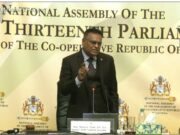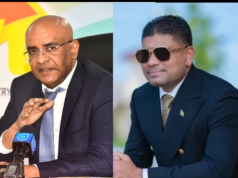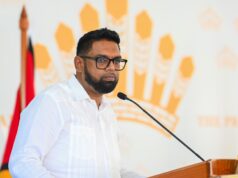Dear Editor,
The recent events associated with the Chancellor`s announced early retirement signifies yet another nail being hammered into the coffin of Guyana`s acclaimed democracy by its pseudo protagonist, the People`s Progressive Party and their kit and kin.
Demos Kratos/ People`s Power (Democracy) is built upon three pillars: representation, responsible conduct of public affairs (accountability, transparency, and inclusion inter alia), and responsiveness.
None of those pillars are akin to the principles of Democratic Centralism. Democratic Centralism is founded on the principle of the dictatorship of the working class (those who produce material wealth with their labour), led by the proclaimed conscious elements of that class, the party and its hierarchical leadership (the rulers), who are at the pinnacle of a top down decision-making (governance) process. It is argued that as the producers of wealth, they have an entitlement to appropriate that wealth. That entitlement is exercised through their rulership, which ensconce decision-making at the top.
The scripted system for democracy in Guyana provides for: i. elections, and ostensibly representation, hence the legislature;
ii. a majoritarian government that administers public affairs, in keeping with the policies, programmes and projects articulated and or approved by the elected representatives (the legislature);
and iii. a judiciary that superintends inter-personal relationships (natural and artificial persons), institutional relationships, and relationships between the state and its citizens.
These three spheres of the operation of the state are the power poles of the state. They are intended to be independent, and regarded as the separation of the powers of the state.
All of the above should be operationalized within the framework of the Constitution, which is referred to as the Social Contract of the People, which is indicative of them having ultimate power (Demos Kratos) as is envisaged of a democracy.
However, the praxis of democracy, in Guyana, reflects a dichotomy. On one hand, the Ruling Party spouts Democracy (bottom- up involvement of the people in the decision-making processes), although its constitution commits it to the practice of Democratic Centralism, in effect dictatorship, which it actualizes by virtue of its manipulation of the Legal System; corruption of the Institutional Arrangements; obfuscation of the administrative processes, and ultimate decision-making by the higher echelons of the party. Hence, the General Secretary (Leader) of the party is virtually the sole spokesperson for the party and government and addresses the nation weekly on all matters from the party headquarters.
At the epitome of this morass are the legislative/representative organs. In those organs, the elected majority prevails without reference or deference to the minority, or inclusion. The Speaker of the Legislature is on record as saying: “The Opposition will have its say and the Government will have its way”. This is indeed the practice. This makes nonsense of representation, since the representation by the minority is ignored, thus under-minding the fundamental principle of democracy: representation, which may also be referred to as inclusion in the decision-making process. This disposition is practiced and blatantly articulated as high up as the Presidency, who insists that ‘there is no need for him to consult or confer with locally elected representatives on local matters’, although the Constitution stipulates that they are entitled to represent local interests and administer local affairs, as is stated in the relevant laws. This is clearly democratic centralism, dictatorship, at work. Even worse, are the ethnic implications. The elected officials in the Legislature and local democratic organs reflect the ethnic diversity of the population and more specifically the ethnic nature the various parties. Hence, their exclusion from the decision-making processes is not just quantitative. It is highly qualitative, ethnic and discriminatory, a la an all Indian committee in a community made-up of over 90% African Guyanese. This is but a microcosm of what happens in the decision-making bodies.
The executive/administrative level is equally crass in its operations. Appointments to public services offices are contrived and fly in the face of Good Governance practices. In-transparency is wide-spread and more than often ethnically, bias in its nature. One can easily recall a previous Head of the Presidential Secretariat`s claim that there were no African Guyanese qualified for diplomatic postings. This was said, after the then Minister of Foreign Affairs toured the diplomatic missions overseas and dismissed scores of career African Guyanese diplomats. The unjustifiable dismissals were challenged successfully in Court. A more recent court decision saw the former CEO of the Central Housing and Planning Authority, an African Guyanese, gaining judgment for wrongful dismissal by the subject Minister. Not in all instances does the legal system provide for recourse. At the level of GECOM, top officers, mostly Indians, were employed, although they did not meet the essential requirements specified by GECOM, in preference over highly qualified local and overseas African applicants.
The Judiciary has been no different. Imagine, persons with absolutely no court experience were elevated to the bench over others with much experience. Here again, the ethnic preference stood out. The recent musical chairs at the highest level of the Judiciary crowned it all. On the eve of elections, a season for litigation, the Acting Chancellor ostensibly took leave thus making way for the appointment of an Indo-Guyanese Chief Justice Acting of some public notoriety in preference to judges of much more repute and experience. Worse yet, the Acting Chancellor actually resumed to the clumsy and ugly situation of that Chief Justice Acting refusing to relocate to his previous post and office, thus causing the Chancellor Acting, who was reverting to her former position (Acting Chief Justice ), to work out of a board room, while the early retirement of the Acting Chancellor was orchestrated. This was followed by a brazen attempt to have both of the actors installed in the positions in which they were acting, during the leave of the Acting Chancellor, as the Acting Chancellor was sent on early pre-retirement leave.
At every level of the state, the systems have been corrupted by the application of Democratic Centralism. Even the President has been fingered for directing that the due processes of GRA be by-passed to facilitate waivers to the tune of 100s of millions of dollars; and Police Officers of Indian descent supersede more eligible officers of African descent. The General Secretary of the PPP rationalizes these acts as providing for his constituency, and seeks to mainstream them by accusing the PNC of not doing likewise and not looking out for its people during their term of office. What a way to veil the corruption of the system.
It may not be seen as veiling by the perpetrators. It may well be an undertaking under the guise of achieving Administrative Power, a coinage of the late President Jagan, who contended that having come into office, he was bereft of administrative power. He did not have his men in all positions. He clearly pushed back against the intended neutrality and professionalism of the Public Service, in showing preference for his choices of administrative personnel in breach of the established employment practices of the Public Service and promotions and/or appointments based on merit.
Responsive objections to, and protestation of, these acts are met with vile threats, victimization, and even armed suppression by the Police Force, a la the pelleting of unarmed and peaceful protestors. The media, a major medium through which the citizens respond by expressing their views on public policy, and the conduct of public affairs are harshly criticized and threatened with sanctions, such as the withholding of state advertisements (economic sabotage).
The reality is that democracy is spouted. While, the citizens are selectively held to the norms that flow from the articulation of democracy, the rulers, the democratic centralists, trample upon democracy in pursuit of absolute control.
Yours truly,
Vincent Alexander
Desmond Trotman











